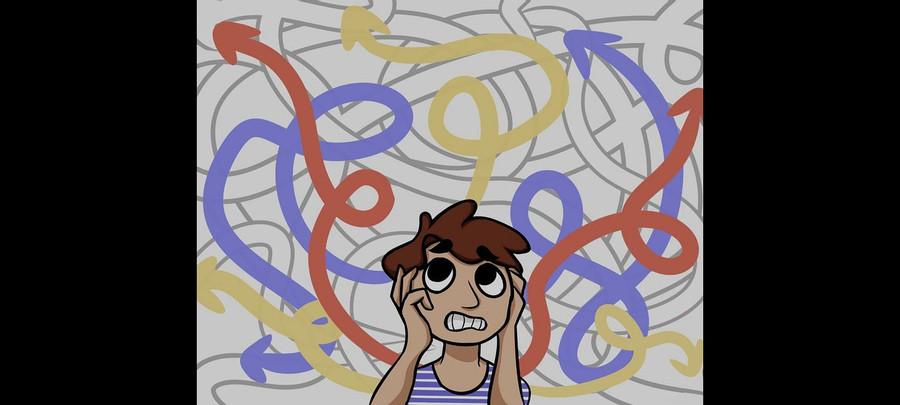Nicholas York's Key Ideas from Rationality
by Steven Pinker
Ideas, facts & insights covering these topics:
20 ideas
·20.3K reads
78
2
Explore the World's Best Ideas
Join today and uncover 100+ curated journeys from 50+ topics. Unlock access to our mobile app with extensive features.
Rationality: What Sets Humans Apart From Other Species
- Rationality is a tool for achieving a goal.
- Rationality aids in the decision-making process.
- Ignorance and self-restraint are both viable options.
- Science is the application of logic to the real world.
- We become less partial — and more sensible – as a result of institutions.
- People are punished for their own good, which leads to a more rational commons.
- Because it is rational, our most important moral principle is powerful.
189
2.89K reads
Rationality Is a Tool for Achieving a Goal
The definition of rational, according to dictionaries, is "having a reason." And the term reason derives from the Latin word ratio, which means "reason."
Rationality, according to philosophers, is the ability to use information to achieve goals.
The term "knowledge" refers to true beliefs that are supported by evidence. We wouldn't consider someone rational if they acted on incorrect beliefs.
But rationality entails more than just believing correct thoughts like "1 Plus 1 = 2." It also facilitates our tasks.
174
1.93K reads
Rationality Is Merely a Means to An Aim
When one path is blocked, we may always attempt another. This is human rationality in action.
Reason is a tool for achieving a goal.
Passions are the source of goals. That is, feelings such as love, rage, pride, envy, and fear stem from desires, drives, and emotions like love, anger, pride, envy, and fear. Reason, therefore, is the "slave of the passions."
Reason alone cannot tell us which goals to pursue. They're neither rational nor irrational in a logical sense - they're arational.
However, there are instances when we must choose between competing objectives. That's when logic comes into play.
172
1.52K reads
The Conjunction Fallacy
The conjunction fallacy occurs when a person assumes that specific conditions are more likely than a single general one.
What are people thinking? A class of events described by a single statement can be generic and abstract, with nothing for the mind to hold on to. A class of events described by a conjunction of statements can be more vivid, especially when they spell out a storyline we can watch in the theatre of our imagination. Intuitive probability is driven by imaginability: the easier something is to visualize, the likelier it seems.
171
1.34K reads
The Availability Heuristic
The availability heuristic is a method of making decisions based on familiar facts - anything that has left a lasting impression on our minds.
There is too much information circulating in society to evaluate the truth of each point or lack thereof. To combat this, we create mental shortcuts. When we are presented with new information, we make a quick inventory of our current beliefs in order to form an initial assessment of the material’s veracity.
170
1.13K reads
Our Judgements Are Mostly Irrational
The media has amplified our irrational judgments. One classic example is the safety of flying versus driving.
The world’s roads account for 1.3 million fatal accidents each year, while plane crashes kill 250 people.
We hear about the single plane crash of the year, but not about the 364 days of safe air travel. If news outlets used the same approach with cars, they would have to run the headline, “35,000 dead in road accidents yesterday,” every single day.
173
1.06K reads
Bayesian Reasoning: Probabilistic Thinking
Bayes’ rule or Bayes’ Theorem is the law of probability governing the strength of evidence—the rule saying how much to revise our probabilities (change our minds) when we learn a new fact or observe new evidence.
Probabilistic thinking means avoiding absolutes. When we express the likelihood of our beliefs, we open the door to further discussions. Rather than expressing things in black and white terms, as true or false, try saying: ‘I’m an 80 on that’, or ‘I’m only a 25 on that’. As a result, we remain receptive to new evidence while gathering information to guide future truth-seeking efforts.
180
994 reads
Ignorance and Self-Restraint Are Both Viable Options
Knowing something does not imply that you will act rationally on it.
Willpower isn't always up to the challenge of resisting temptation.
Preventing yourself from acting on temptation is one approach to fighting it.
If you go shopping after you've eaten, for example, it's much easier to resist the siren melodies of unhealthy treats. Similarly, if you've advised your company to set aside a portion of your paycheck for retirement, you can't spend money you know you should be saving.
170
888 reads
Ignorance To Combat Bias
Selective ignorance can also be used to combat bias. That is why jury members are not allowed to see inadmissible evidence obtained through coercion or hearsay.
Good scientists also protect their work from bias by performing double-blind studies in which they are unaware of which patients received medicine and which received a placebo. In both circumstances, ignorance aids in maintaining objectivity.
165
820 reads
Motivated Reasoning
Motivated reasoning describes how we let our beliefs mold our perception of the world, ensuring that we see things as we are, not as they are.
When we add a belief to our arsenal, evidence for why it’s true begins compounding. Even if provided with proof that disproves these beliefs, we will interpret such evidence in ways that support our currently held narratives.
The human brain is not a level playing field for rational decision-making. The myth that we are reasonable creatures stems from the incorrect assumption that our brains are, by default, instruments of logic.
169
778 reads
We are all capable of believing things which we know to be untrue, and then, when we are finally proved wrong, impudently twisting the facts so as to show that we were right.
GEORGE ORWELL
180
821 reads
Confirmation Bias
Confirmation bias causes us to focus on the information that reinforces our beliefs while ignoring or distorting disconfirming evidence. Part of this reasoning is our tendency to treat ideas like possessions, things we wish to retain at all costs.
People are often more concerned with winning an argument than discovering the truth. Truth-seeking has become a competition that rewards dogmatic beliefs and outlaws open-mindedness. This has given rise to the social notion that changing our minds is a sign of weakness. When, in fact, it is a sign of substantial intellectual strength.
176
709 reads
The test of a first-rate intelligence is the ability to hold two opposing ideas in mind at the same time and still retain the ability to function.
F. SCOTT FITZGERALD
175
761 reads
The Bandwagon Fallacy
According to the bandwagon fallacy, something is true simply because it is popular; therefore, the popularity of something validates its truth.
Product advertisers use this ploy every time they use phrases like “most popular,” despite the fact that the popularity of a product is irrelevant to its merits
172
702 reads
The Genetic Fallacy
The genetic fallacy describes accepting a claim as true or false solely based on its origin. An idea's source doesn’t validate or invalidate its claim to truth, yet it is one of the most prevalent fallacies you will encounter in the 21st century.
169
719 reads
The Affective Fallacy
In literary criticism, the affective fallacy refers to evaluating works based on the effect they have on the reader, who is free to reject anything deemed harmful, hurtful, or uncomfortable. The opposite is equally true. Although often described as a literary criticism term, the fallacy applies to any case where someone judges the validity of a message solely on its emotional impact.
169
672 reads
Myopic Discounting
Myopic discounting is the reversal of preference based on the distance to the reward. Its name derives from myopia, which means a lack of discernment or foreseeing.
The preference reversal is called myopic, or nearsighted, because we see an attractive temptation that is near to us in time all too clearly, while the faraway choices are emotionally blurred and (a bit contrary to the ophthalmological metaphor) we judge them more objectively.
170
661 reads
Hyperbolic Discounting
Hyperbolic discounting is closely related to myopic discounting and points out our tendency to choose immediate rewards over future ones, even when the immediate rewards are smaller. Succumbing to this tendency results in poor decision-making because it promotes impulsivity and immediate gratification, behaviours that prioritize short-term enjoyment over long-term wellbeing.
174
654 reads
Appeal To Emotion Fallacy
When someone makes a claim to promote an emotional response rather than provide relevant facts to support their argument, they commit the appeal to emotion fallacy.
While arguments often contain emotional components, the appeal to emotion fallacy occurs when a person uses emotion to manipulate and hide the fact that they cannot offer a rational counterargument.
169
616 reads
Guilty by Association
When we pass judgment on someone simply because they are associated with someone we already have an opinion about, this is known as the guilty by association, or association fallacy.
If there is a particular podcast host we dislike because of their terrible takes, every guest of theirs may leave a sour impression in our minds. When we next see the guest's name appear online, we will interpret everything they say in a negative light due to the traces the negative association has left in our minds (availability bias).
168
623 reads
IDEAS CURATED BY
CURATOR'S NOTE
Biases distort our cognitive system and prevent us from making rational decisions. The myth that we are reasonable creatures stems from the incorrect assumption that our brains are, by default, instruments of logic. Through analyzing the most common cognitive fallacies, we’re taken on a journey through the mechanics of the mind towards the root of our irrationality, which the author argues is due to motives shaping our judgment.
“
Nicholas York's ideas are part of this journey:
Learn more about psychology with this collection
Understanding the concept of the self
The importance of living in the present moment
The illusion of control
Related collections
Discover Key Ideas from Books on Similar Topics
14 ideas
The Happiness Hypothesis
Jonathan Haidt
9 ideas
8 Logical Fallacies that Mess Us All Up | Mark Manson
markmanson.net
11 ideas
Presence
Amy Cuddy
Read & Learn
20x Faster
without
deepstash
with
deepstash
with
deepstash
Personalized microlearning
—
100+ Learning Journeys
—
Access to 200,000+ ideas
—
Access to the mobile app
—
Unlimited idea saving
—
—
Unlimited history
—
—
Unlimited listening to ideas
—
—
Downloading & offline access
—
—
Supercharge your mind with one idea per day
Enter your email and spend 1 minute every day to learn something new.
I agree to receive email updates


















